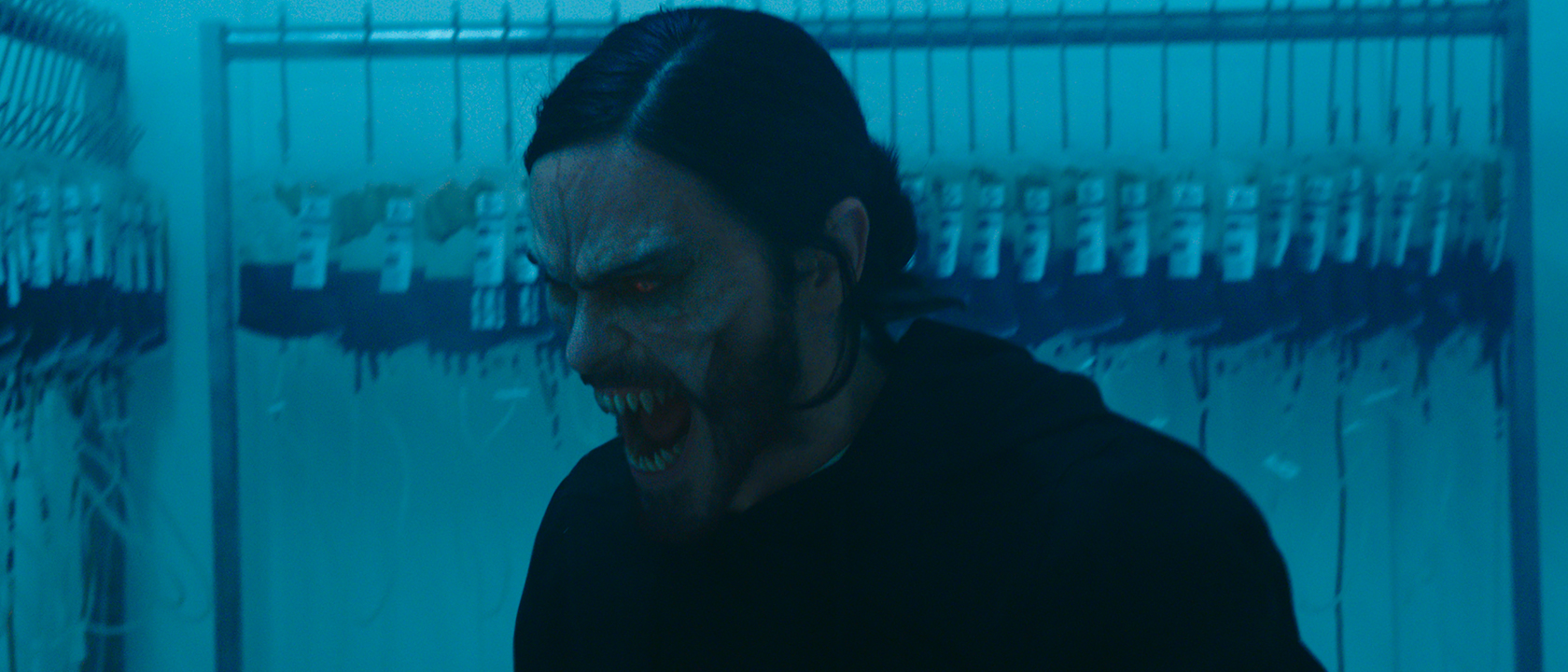Comic book movies have come a long way in the last 20 years. In the aftermath of Blade, X-Men, and Spider-Man, which successfully revolutionized the genre, the industry unleashed a series of shallow, hollow ventures that were consistently cringe-worthy, but proper creative investment in the material eventually dismissed that terrible era. As full potential in the material has been recognized, the films are now made with the specific intention of having depth and emotion come part-and-parcel with spectacle and flash. The storytelling has improved tremendously, allowing audiences the world over to discover what readers of Marvel and DC magazines have known for decades.
While watching Daniel Espinosa’s Morbius, I found myself regularly thinking about this special pop culture evolution. With as many great things we have seen come out of comic book movies in recent years, the finished product here suggests that the brains behind the operation weren’t cognizant of any of them. In a time when on-screen superheroes and supervillains are more dynamic and complex than ever, Morbius is the worst, most boring version of itself that it can possibly be – happy to serve up a narrative that is 100% plot, fail to introduce even a single interesting or compelling character, and execute action that is nothing more than murky shadows accented with colorful smoke.
Jared Leto is the eponymous Michael Morbius in the film, a scientist who has long lived with a debilitating blood disorder that he has spent years trying to cure. Working with Dr. Martine Bancroft (Adria Arjona) at New York-based Horizon Labs, he hypothesizes about mixing human DNA with that of a vampire bat, believing that the flying rodents’ natural anti-coagulants will be the key to eradicating his disease. After animal testing, he prepares for human trials – which is to say giving himself an injection.
Because it’s an illegal procedure, Morbius has to get private funding for the experiment from a childhood friend suffering from the same condition, Milo (Matt Smith), but before too long he is out in international waters on a cargo ship with Dr. Bancroft and a team of armed mercenaries. (Why armed mercenaries? Your guess is as good as mine.) Of course, the procedure goes horribly wrong, as the genius doctor is transformed into a feral beast and needs to drink human blood to keep himself under control and healthy. (It’s worth noting that he never actually tries to see if animal blood will do the trick.)
Morbius sees himself as a monster after killing several people, but Milo is purely focused on the cure to the blood disorder, and after taking his own dose, he becomes your standard mirror villain: possessing identical abilities to the hero, but with an antagonistic philosophy.
Morbius is built on a rote plot and no discernable theme.
The nicest thing that I can say about Morbius is that it is efficient in its storytelling – but even that’s a shaded compliment given that ruthless efficiency serves to drain any and all flavor out of the proceedings. There are no styles or textures applied, and not even a single scene in the entire 104 minute runtime that gives insight to the personalities and perspectives of the characters beyond what is happening in the moment. The script coldly navigates from plot point to plot point, failing to engage with the details of the world, and just execute Origin Story 1.0.
This zero frills/nothing interesting approach is only made more noticeable by the ideas that it ignores. For example, Morbius has invented an artificial human blood that prevents him from drinking the real stuff, and it’s implied that there is a different effect that it has on him, but it’s never made explicit. It’s also repeatedly said that the efficacy time of what he imbibes is diminishing, and he tracks the progress on his digital watch – but even with that introduced, the film never does anything as compelling as having the protagonist in a race against the clock before he goes full living vampire.
Your Daily Blend of Entertainment News
The greatest actors in the world couldn't make Morbius' bland cast of characters exciting.
The most devastating side effect of the structure and pacing of Morbius is what's done to the characters, who are all steamrolled into 2D-ness by the plot. There isn’t a single role that can’t be summed up in two words. Jared Leto’s Morbius: Sad Vampire. Matt Smith’s Milo: Happy Vampire. Adria Arjona’s Dr. Bancroft: Loyal Partner. Jared Harris’ Dr. Nicholas: Paternal Figure. Tyrese Gibson’s FBI Agent Stroud: Serious Cop. Al Madrigal’s Agent Rodriguez: Sarcastic Cop. It’s the entire cast – though nobody could pin the blame on the actors given what they are working with.
Usually in movies this bad, there is at least one person in the ensemble who demonstrates a fourth wall-esque awareness of the crap they are contributing to and delivers a wink-filled performance that suggests that they are at least trying to have some fun –but not Morbius. There is no relief of that sort offered by this film, and it’s all the more punishing because of it.
I wish good luck to audiences trying to figure out what's going on in Morbius' action sequences.
On top of everything else, even discernable, impactful action sequences are beyond the film’s grasp – though it is very clearly working at a disadvantage because of its PG-13 rating. Between what’s being chugged and what’s being spilled, there is a lot of blood in Morbius… but that gets a big no-no from the MPAA when a studio is trying to sell a movie to under-18 audiences. The “shortcut” utilized to get around this is to have everything play out in shadow or at night, but the end result is that you can rarely tell what the hell is going on.
Only hurting and never helping are VFX flourishes that are painted in seemingly reflecting the main character’s echolocation abilities and perception of air currents, allowing him to fly (admittedly I’m meeting the movie more than halfway with the second one, as that’s purely my understanding of what’s going on). The goal in part seems to be to add some nice rainbow splashes in the otherwise caliginous palette, but all it really accomplishes is adding heavy doses of blur.
If you’re one who follows the business side of the film industry, you know why a Morbius movie exists: Sony is white-knuckle desperate to be relevant in the world of superhero blockbusters, and it is passionately trying to wring every single last dollar that can be made from its ownership of the big screen rights to Spider-Man and all Spider-Man related characters. Commercially speaking, it’s all kinds of logical, but artistically, it’s been a total train wreck – with this loathsome latest product being the follow-up to the dismal twosome of Venom and Venom: Let There Be Carnage.
Morbius is a movie that is so creatively bankrupt and lacking in entertainment that I feel compelled to actively implore anyone reading this review to not purchase a ticket and let it die a quick, flopping death. There is no fun to be had here; there isn’t any ironic or “so bad it’s good” enjoyment. It’s soulless. It’s oozing, tar-like gunk that has been spit out of the Hollywood machine, and you should avoid stepping in it.

Eric Eisenberg is the Assistant Managing Editor at CinemaBlend. After graduating Boston University and earning a bachelor’s degree in journalism, he took a part-time job as a staff writer for CinemaBlend, and after six months was offered the opportunity to move to Los Angeles and take on a newly created West Coast Editor position. Over a decade later, he's continuing to advance his interests and expertise. In addition to conducting filmmaker interviews and contributing to the news and feature content of the site, Eric also oversees the Movie Reviews section, writes the the weekend box office report (published Sundays), and is the site's resident Stephen King expert. He has two King-related columns.

